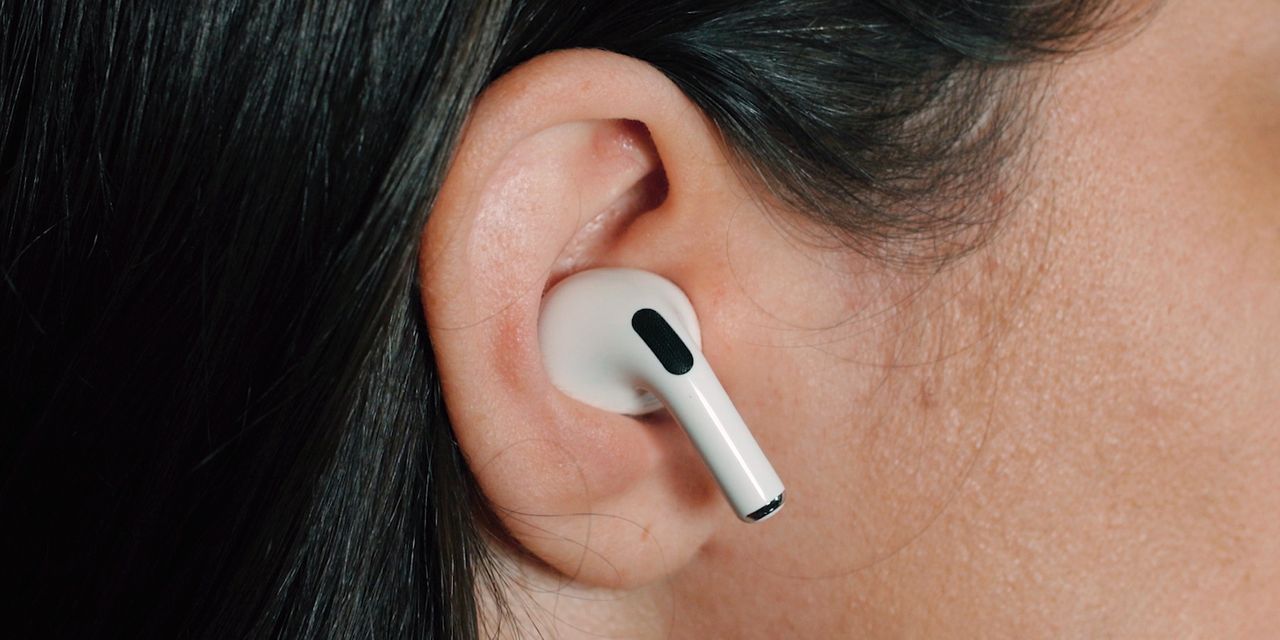

Apple Inc.
is studying ways to make AirPods into a health device, including for enhancing hearing, reading body temperature and monitoring posture, according to documents reviewed by The Wall Street Journal and people familiar with the plans.
The plans further demonstrate Apple’s ambition to add health and wellness features to devices beyond the Apple Watch, where most of the company’s health functions exist today. Apple is also working on technology that aims to use iPhones to help diagnose depression and cognitive decline, the Journal reported last month.
It isn’t clear if Apple is developing specific new hearing-aid features for AirPods or wants to market the earbuds’ existing hearing-improvement features as hearing aids. AirPods Pro, Apple’s higher-end earbuds, already offer features to improve hearing, including “conversation boost,” launched last week, that increases the volume and clarity of people in front of the wearer.
The proposed AirPods features aren’t expected by next year and might never be rolled out to consumers or the timing could change, cautioned people familiar with the company’s plans.
An Apple spokeswoman declined to comment.
Would you consider wearing AirPods as a health device? Join the conversation below.
Apple is already developing prototypes for AirPods to take wearers’ core body temperature from inside their ear, according to the documents reviewed by the Journal. The thermometer would be the second that Apple could add to its devices, including a new wrist temperature-sensor Apple may include in next year’s version of the Apple Watch, the Journal previously reported.
As for ergonomics, the AirPods would lean on the motion sensors in the earbuds and alert wearers of slouching and to improve their posture, according to the documents and a person familiar with the idea.
Offering AirPods as hearing aids could significantly expand their reach. Millions of people suffer from hearing loss, including many whose impairment is less severe and choose not to treat it, experts say.
New regulations, expected to be completed by the U.S. Food and Drug Administration next year, would permit the sale of a new class of cheaper hearing aids direct to consumers to treat mild to moderate hearing loss.
About 28 million Americans suffer from mild hearing loss, yet only 5% use a hearing aid, estimates the Cochlear Center for Hearing and Public Health at Johns Hopkins. Another 12 million suffer from moderate hearing loss, though only 37% of this group use a hearing aid.
Dr. Nicholas Reed,
an audiologist at Johns Hopkins, said the prospect of Apple offering future AirPods as an over-the-counter hearing aid would be a potential game-changer. He said that Apple’s ubiquitous earbuds can break the old-age stigma associated with traditional hearing aids, which often prevents people from wearing them, and would cost far less than traditional hearing aids.
AirPods may not be suited for some sufferers of hearing loss because they don’t yet have all-day battery life. Also, Apple has been beaten to the hearing-aid market by consumer electronics rival Bose, which sells an FDA-cleared hearing aid that consumers can customize themselves.
AirPods dominate the global Bluetooth headset market, generating $12.8 billion in revenue in 2020, estimates research firm Strategy Analytics—five times the figure of No. 2 player Bose.
The array of sensors in the devices, including microphones, an amplifier and a sophisticated processor, means AirPods Pro already contain much of the technology necessary to help sufferers of mild or moderate hearing loss, experts say.
The market for hearing aids is dominated by a handful of companies, and hearing aids can cost thousands of dollars. Cheaper “personal sound amplification products” are available in stores, but their quality is inconsistent, experts say.
AirPods can’t be marketed as hearing aids today because of federal regulations that date back decades to when many hearing aids were unsafe or ineffective. Those restrictions require the devices to be sold through licensed hearing specialists who tune the hearing aids to the wearer.
The FDA is working to complete safety and effectiveness rules as required by a 2017 law for a new category of over-the-counter hearing aids that consumers can tune themselves. The rules are expected to permit companies like Apple, Bose and
to market cheaper hearing aids.
Write to Rolfe Winkler at rolfe.winkler@wsj.com
Copyright ©2021 Dow Jones & Company, Inc. All Rights Reserved. 87990cbe856818d5eddac44c7b1cdeb8
24World Media does not take any responsibility of the information you see on this page. The content this page contains is from independent third-party content provider. If you have any concerns regarding the content, please free to write us here: contact@24worldmedia.com

Common Mistakes When Using Athletic Field Tarps

High-Performance Diesel Truck Upgrades You Should Consider

Warehouse Optimization Tips To Improve Performance

Fire Hazards in Daily Life: The Most Common Ignition Sources

Yellowstone’s Wolves: A Debate Over Their Role in the Park’s Ecosystem

Earth Day 2024: A Look at 3 Places Adapting Quickly to Fight Climate Change

Millions of Girls in Africa Will Miss HPV Shots After Merck Production Problem

This Lava Tube in Saudi Arabia Has Been a Human Refuge for 7,000 Years

Four Wild Ways to Save the Koala (That Just Might Work)

National Academy Asks Court to Strip Sackler Name From Endowment

Ways Industrial Copper Helps Energy Production

The Ins and Out of Industrial Conveyor Belts